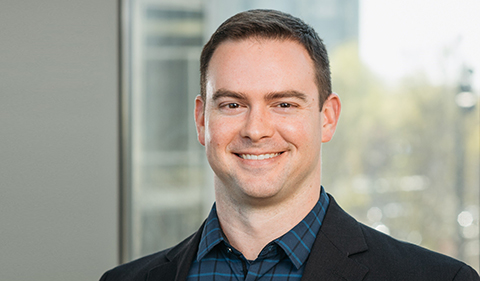
Dr. Christopher Campbell
Christopher Campbell ’06 ’09M enters his third year this Fall as an assistant professor at Portland State University in the Department of Criminology and Criminal Justice. He teaches both undergraduate and graduate research methods, community corrections (e.g., probation and parole), juvenile delinquency/justice, and offender rehabilitation.
“While I thoroughly enjoy teaching students at all levels as it progresses knowledge generationally,” he says, “I also love to conduct the research that helps to progress society’s knowledge of offending/desisting, and puts it to work in policy and practice.”
He graduated from the College of Arts and Sciences at Ohio University with is BA in Sociology-Criminology and MA in Sociology, then worked for the Ohio Justice & Policy Center before (and while) attending Washington State University.
After completing his PhD in criminology and criminal justice, he was fortunate to continue his research and teaching at Portland State University. Campbell is engaged in many research projects which aim to further explore causes of crime as well as help our government agencies respond to it.
Recidivism, Perceptions, Deterrence – and Data Analysis
His research emphasizes the compilation of basic and applied research to generate cumulative knowledge for the sake of making our justice system evidence-based and fair in its application. The majority of his work consists of evaluating correctional strategies within adult and juvenile corrections settings, both community and institutionally based.
Campbell’s recent research has involved evaluating the use of “swift and certain sanctions” on recidivism in probation/parole cases, the utility of violation-based revocations of parole, and study of the connection between institutional treatment programing and prison violence. Other areas of his research include projects that explore how perceptions of procedural justice can help improve court processes (e.g., public defense) and order within prison systems.
His current work focuses on unpacking deterrence (e.g., knowing when it does and does not “work” for offenders), and improving community supervision of offenders to increase successful reintegration into society (i.e., less reoffending, and more prosocial contributions to the community). Being on an urban campus has provided many opportunities to work with diverse agencies and students.
Throughout his research Campbell places great importance on the use of mixed methods to investigate research questions. In his projects he employs quantitative data analysis with cross-sectional and longitudinal correctional administrative data, quasi-experimental designs using propensity score matching, interviews, focus groups, and survey research.
“Ultimately, the aim of my research is to strengthen our knowledge of criminal behavior and its causes, and in turn, improve our societal and systemic responses to it,” Campbell says.
His OHIO Experience
“I can’t say enough about how my OHIO experiences have shaped where I am today.”
Campbell came to Ohio University with the idea that he wanted to go into the military and likely law enforcement. After having classes with faculty like Dr. Thomas Vander Ven, he left the undergraduate sociology program with an insatiable desire to learn more about mechanisms, successes, and failures that embody juvenile and adult justice in the United States.
Throughout his time in the master’s program, he was exposed to working in prisons and with inmates in the various correctional sites in neighboring Nelsonville, which is where he developed an interest in reentry. Additionally, in many of his classes with Dr. Christine Mattley and Dr. Jieli Li, he developed a passion for perspectives related to gender and symbolic interactionism, both of which drive a great deal of his teaching and research today. Beyond that, the time that Dr. Cynthia Anderson spent with him and his cohort to develop their teaching skills strengthened his attentiveness to constructing and managing a productive and meaningful pedagogy.
“Without a doubt, I would not be where I am today if it was not for my amazing experiences at Ohio University, and the terrific faculty there,” he concludes.
There is Always Something to Learn
“Stay motivated and open to new things,” Campbell advises. “Find the interesting aspect of everything, even the boring stuff. No matter how mundane, outdated, or out-of-touch a subject (or people) may seem, there is always something meaningful to observe and learn from it/them.”



















Comments